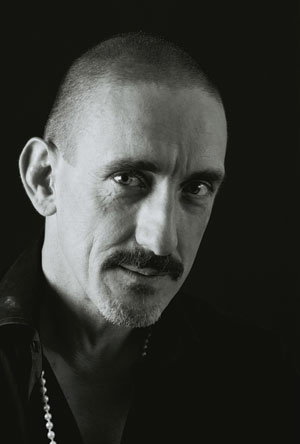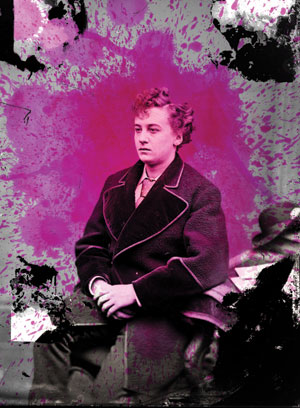Stella: Neil Bartlett talks about his new play
How did you discover the story of Ernest Boulton and Stella?
It was 1983 and I was working on my first book, a history book called ‘Who Was That Man?’ about Oscar Wilde’s place in gay mens culture in the late 19th century. This is back in the dark ages remember before queer studies existed, people tell me now that I pioneered queer studies, and I say: “That’s fine, I didn’t mean to”. I found this extraordinary story, which other people have written about, I wasn’t the first person, about Stella. I went to the public record office, where in a big fat ledger is the trial transcript and all of the letters which the police seized when Stella was arrested as a young man and then I went on from there into the bowels of the British Library and dug out all the scripts of the plays that Stella used to appear in. So, she’s been with me for a very long time and I wrote about her in book which was published in 1988.
Was female impersonation a common thing in the entertainment world at that point in time?
They were referred to on play bills as female impersonators or female personators and in both America and London, both men appearing a women, normally as comedy acts, what we’d call cod-drag, rather than glamour drag, and also women playing men. Some of the biggest and highest paid stars of the British musical – Hetty King, Vesta Tilly, were male impersonators. The first really highly paid of the British Female impersonators, would probably be Malcolm Scott, who was headlining in London around 1902. So it was not unknown, Stella was part of a culture, she wasn’t just a mushroom springing up in the night. Queens going out on the town in either highly effeminate male clothing, which he did a lot as a young man, or actually crossed dressed – it was not unheard of.

Was there a turning point when Ernest started to go out more as a woman?
The records of Stella’s life come from two sources, the police and the press – neither are reliable sources, but certainly around the period between his 21st birthday and when he got arrested, he was spending a lot of time as his female aliases. He had more than one character, when he was passing as a creature called Lady Stella Pelham Clinton, he resided in a flat in Bruton Street, which is now as it was then, a posh part of town, and he lived there as a passing woman, with his lover of that time who was Lord Arthur Pelham Clinton, who gloriously was a Conservative MP.
Arthur paid for the flat and for Stella’s wardrobe, a maid who lived in the house and who thought that Stella was a woman which she testified to. She also had a hairdresser who came to the house every day to do her hair. Meanwhile she also had another home, which she paid for herself, as far as we know with some friends, a room in a house in Wakefield Street, just South West of St Pancras, nowhere near as salubrious, and there she would drag up as a creature known as just ‘Stella’ and sometimes Stella the star of The Strand. Stella’s style was less ladylike, in fact from the records of her behaviour I would say that she was a crossed dressed sex worker. But an informal sex worker, so whether it was hard cash or a good night out with fringe benefits on the side is not entirely clear. The night that she was arrested the man she was arrested with swore blind in court that he thought Stella was a woman, which is a bit tricky because he had actually seen Stella in male clothes. He tried to argue that he thought she was a woman crossed dressed as a man – oh yes, pull the other one your honour! But clearly she could pass when she wanted to and now, as then in the sex industry, different strokes for different folks, some men want a woman, some men want a woman with a penis, some men want a queen dressed as a woman, and some men don’t care what brand of sex it is as long as they can afford it. So there’s a whole web of culture behind Stella’s glorious appearance.
I got the drift that he was quite sad and lonely before he died, did he ever find any sort of happiness in his life?
Well, his sadness and loneliness we have to speculate on. His last known address was in Euston Street, which is down the back of Euston Station and that doesn’t indicate being particularly well off. He died in the National Hospital on Queens Square, quite young by our standards at 56. The only photographs we have of him are when he was young. In the American photos you can see that the really dazzling beauty of the 19 – 20 year old Stella is starting to fade. She’s playing more the dignified widow than the glamourous young girl. There are no records of him having any family or close friends or a partner at the end of his life. The sadness is assumed, although I would never assume that a queen on her own was sad. The Stella of my play isn’t sad, she’s terrified, she’s furious, but she’s not sad. This was a tough cookie, months after she was in the dock at The Old Bailey, we all know of Victorian England right? If you were on the front page of the London newspapers, in the dock of The Old Bailey as a crossed dressed queen, what would happen to you? We all know that you would disappear and live a life of solitude, ignominy and shame. I don’t think so, she was back on tour within three months. Then she dyes her hair blonde and goes and takes Broadway by storm. So this is a tough cookie.
So she was quite a successful performer?
She was a successful performer – a couple of her playbills when she was in New York show her to top of the bill at The Olympic, ‘The wonder of the world’ Earnest Bing, she changed her name, but she changed her name all the time, she was Earnest Boulton, Earnest Blair, she was Stella, she was Stella Lady Clinton. So she wasn’t doing bad, but actually the records of a touring schedule show that she comes back to this country after a short while in America and she tours for another 25 years and by the end of her touring life, the early 1890’s, Oscar Wilde time, she’s playing slightly smaller theatres on the Isle Of Man. So in other words she slipping, if you’re glamour drag, which she was, her fortune was her face but she also had a very beautiful high soprano voice and she was gorgeous.
So she didn’t allow the prosecution to end her career?
Absolutely not. We underestimate the astonishing resilience of the queen as a species and also we’ve swallowed hook line and sinker, this idea that the old days, whether that was the 1950’s or the 1890’s (two of the dark ages in queer history) that all we ever did was suffer, but we keep on finding these extraordinary stories of survival. Not just survival, but triumph – she dyed her hair blonde, changed her name and hit Broadway. That’s what really moves me and what I’m interested in is that courage.
Does Stella give you the opportunity to explore contemporary issues about transgender?
I never sit down at my desk and say: “Well today I’m going to explore some contemporary issues about transgender.” After the event someone may say to me: “Oh, that’s really interesting because it reflects on x,y and z.” and I’ll go “yes, that’s true.”
For me I’m a story teller and this was a story too good to let sleep, particularly the story of the older Stella, what’s it like if you’ve been through all of that and now you face the end of you life? I’m sure it’s no accident, I’m the same age that Stella was when she died. Of course we see her story through our contemporary understanding of what gender fluidity means and she holds up a really interesting mirror to us. Stella lived before hormones and correctional surgery were even a fantasy, so her dreams couldn’t have taken the form of one day I might be. Sometimes she just seems like a very effeminate queen, sometimes she definitely seems like a Drag Queen, with a capital D and Q. Other times you look at her and say surely this was a transgender woman – we don’t know. What makes her so fascinating is her final transformation, she died as a man. That we know because she died in a hospital, in1904. The only way she could have been admitted to a hospital was as a man. I’m fascinated by her constant transformation, the idea that this very queer skill of reinventing yourself isn’t about arriving at a destination, it’s about having the most incredible journey. She never stopped changing, literally in the course of a day she would be different people. If you look over her life, firstly she’s a very effeminate young boy, then she’s a bank clerk, then she’s a queen in the west end getting thrown out of the Burlington Arcade because she’s wearing too much makeup, too much jewellery and has made a pass at someone in public. Then she’s a lady in Bruton Street, then she’s a burlesque artist on Broadway, then she comes back to Britain changes her name twice and becomes a very different kind of performer, then she’s this solitary single old man on her uppers round the back of Euston Station. Of course everybody’s life is about change, but sometimes we need to be reminded of that.
When you’re creating a play research forms the bones, but how do you flesh it out?
You sit in your room and stare at the wall. For this piece I talked to a lot of remarkable people. Justin Bond, who is a friend, playwright John Clifford – who is now the world’s most lovable female grandfather Joe Clifford, Scotty and other people that I know who are at different points on the gender journey. I also went to Japan and watched and was lucky enough to meet backstage some of the great onnagata of Japan, particularly one man Tokizo Nakamura V. I got to speak to him at some length about his work. So I fed my imagination in many ways. The person who wrote the play is not me but Stella.
Do you allow the character to drive the story?
Completely, she talks and I write it down and then it is my job to make sense of it and to organise it. That’s your job it has to become something public as opposed to merely private. The play is not a conversation between me and Stella, it’s a conversation between Stella and the audience. I think of it as an encounter more than a play. It’s meeting her, it’s not a history lesson, it’s a piece about contemporary issues with transgender. You get to spend an hour and an quarter in Stella’s company and she talks to you about her life and she also talks to you about yours – she has a few words of wisdom she wants to pass on.
I find it’s interesting at the moment, that given the increasing acceptance, especially in the West, of homosexuality, transgender and cross dressing still remain a taboo. Is that because it’s not an exclusively gay thing? There are a lot of men who cross dress who are not gay – I find it very confusing when a straight man wants to become a woman, does he then become a lesbian?
[laughs] Don’t lose sleep over it! It’s complex but it’s also very simple, there are as many genders as there are people. Full stop. This whole thing about what do I call so and so? Is it he? Is it she? Is it they? You call them by there name, because that’s the whole flipping point. A category is a terrible way of relating to people. We never say to anyone: “hello it’s lovely to meet you, can you define your gender please?
I think people’s eyes are being opened to different points on the gender spectrum at the moment in a really wonderful way. However it’s one thing to be a Facebook friend of Caitlin Jenner, it’s another thing to know someone on a personal level and it’s another thing to not notice. Because I’ve been meeting a lot of people and living some time in this world, we have a very dear crossing dressing gay male friend who my dad knows because we often have Sunday lunch together and my dad’s nearly 90 and as straight as they come, ex gym teacher and rugby player from the 1950’s and he thinks nothing of referring to our friend as ‘she’ and calling her by her female name, infact father would find it really odd if someone referred to our friend as ‘he’. So it’s purely a matter of experience and habit. Of course it all depends on where you are and who you are, if you live in Brighton and you take part in [Gay] Pride every year, which you can’t held but not if you live here. If you are going to be surprised by a transgender person or a drag queen of any denomination, then you’re going to die of a heart attack pretty soon! If you live in Brighton which is a place where lots of people go to transition and also there’s a huge gay presence of every kind, the it’s going to be a completely normal part of your life. In Littlehampton that’s probably not quite so true, never mind Aberdeen, but never assume. What I love is that all bets are now off. I was having a cup of tea in St Pancras with a friend of mine whose 14 year old son cross dresses and no one turned a blind eye, I think it’s just that she cross dresses really well, it’s pretty easy to pass at 14, so no one really noticed, but even if they did, everyones got a train to catch there are more important things in life.
If people want to get you, then someone who is crossed dressed for whatever reason can be a really easy target and people are looking for targets right now, this country is in a bad way, if there isn’t a muslim or a gypsy in easy reach, then they’ll target a cross dresser. So we should never pat ourselves on the back too much and I always say to people who say: ‘it’s so wonderful today that homophobia no longer exists” If it’s a man who says that to me, I always ask: “Would you like to take hold of my hand?” and we’ll just walk down the street and depending where we are, that will be absolutely fine or you’re just about to find out that the world is not as nice a place as we think.
I had a problem with Pride when it stopped being a protest and became a carnival. I think it’s great to have a carnival, but we need to have the politics back a little bit.
In a way a carnival is wonderful, but we only went through all of that shit in the 1980’s so we could go away and live our lives exactly the way that we choose, so that’s wonderful. But certainly a lot of the younger queer people that I meet, they’re very switched on to the bigger picture. For one this is a global picture, it’s all very well to say that we can walk down the street in Brighton and Worthing (where I live) holding hands, no one really notices or minds, but do you have to think twice when you go on holiday? Are you going on holiday to Turkey this year? Probably not a good idea to hold hands with your boyfriend in Istanbul. For me that’s not really a problem as we can trust queens in Turkey to sort themselves out There are much bigger things, why do we still live in a culture built on gender inequality? Sometimes on a structural level, why do we still have a ridiculous pay gap between women and men? Why do we still have this ridiculous under representation of woman in every flipping walk of life? But importantly why do we still equate strength and power and boorishness and violence of being male qualities, whereas beauty and softness and nurture are female. I grew up in the straightest whitest town in the world, Chichester in West Sussex and I’m still waiting for the value systems in which I grew up in, where men must be men and women must be women – we’re making progress but jesus christ i’m nearly 60, could we get a move on!
I think that young people are very switched on to the connections between queer struggle and feminist struggle in particular and I think that’s great.
Going back to the play, how difficult or easy was it to cast the roles? Did you have someone in mind all along?
No, not with this one. I cast the play the same way that I have cast all of my work for the last 30 years, I work with a really great casting director called Siobhan Black, who knows me and my work inside out, we meet a lot of actors and I audition them. And I found the right two, this one presented a particular task which is that the shortest way of describing Stella, is that it’s a one man show for two bodies, because you meet Stella twice on two very significant evenings in her life. One of those evening happens in 1869 and one happens in 1904. One is when she’s the young beautiful Stella on her 21st birthday and one is Stella just two weeks before he died. I had to cast a pair, and you have to believe that this pair could be the same person.
So physically they have to be similar?
Yes. You have to believe that this is the same person, physically and vocally. Also you have to find an actor who can enter into this very extraordinary world, so an actor with a very broad imagination. But actually casting for the kind of work that I make on one level is brutally simple, somebody walks into the room and you go: “That’s it! You’re it” it always comes down to that in the end. You can talk until you’re blue in the face about what you need, what you have to do is meet people and then you see someone and you go: “That’s it”. Sometimes in my life I meet the person first and then I write something for them, for this I wrote the piece first and then we found someone. But that’s fine, it worked. I’m very happy, young Stella is being played by a lad who is relatively recently out of drama school, so it’s one of his first jobs and older Stella is being played by Richard Cant, who people saw in My Night With Reg, Richard was the older queen with the cropped silver hair. He also famously played Audrey, in Declan Donovan’s Cheek by Gowl in all male ‘As You Like It’. He was also one of the lead actors in the first cast of Warhorse playing the German soldier.
How important is it for you to continue this relationship you have with Brighton Festival?
Very, I love The Theatre Royal, I’ve played in a lot of theatres by this point in my career and it’s one of my absolute favourites. Fantastic atmosphere, fantastic relationship between the stage and the audience. I love the audience at The Brighton Festival, they are smart and up for it, they come with an open mind, and they turnout right across the board. I don’t think Andrew Comben ever sits in his office saying: “That’s too weird for Brighton”. Brighton audiences will give it a whirl and I love that. It’s a wonderfully open and inclusive and exciting festival and you may get to meet Laurie Anderson – what’s not to like? It’s a real honour to be part of this programme, what a fantastic collection of artists. I always have a really good time and this is my seventh show for the festival and we’re already talking about the next one.
Anything else you’d like to add?
The gist of the show is that it’s a fella sitting on a chair talking to the audience, telling that incredible story. The thing I want to say, what I feel Stella is telling me that I want to pass on, is that it doesn’t matter who you are, what gender or category, what maters is how brave you are. This is a dangerous complicated world, and it really matters how you walk though it – she seems to me someone of extraordinary courage and I think these are dark times and I think courage is what we need.




















